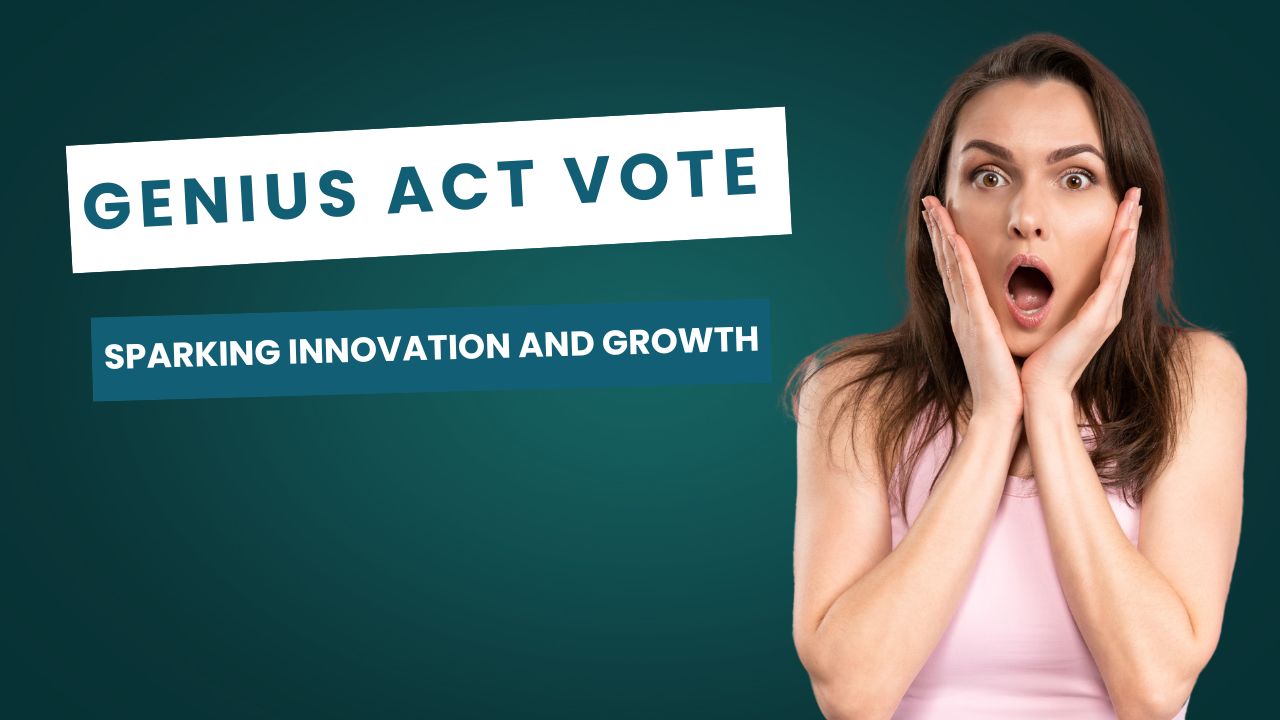
How the Genius Act Vote Impacts Innovation
In recent times, the Genius Act has become a hot topic of discussion. This legislation, designed to boost innovation and creativity across various sectors, has caught the attention of many. But what does the Genius Act entail, and how do the results of its vote impact the future of innovation? Let’s dive into the details and see what this means for innovators and businesses alike.
The Genius Act is a legislative proposal aimed at fostering innovation by providing financial incentives and resources to individuals and organizations that demonstrate exceptional creativity and problem-solving abilities. The goal is to encourage breakthroughs in technology, science, art, and other fields by offering grants, tax breaks, and support systems to those pushing the boundaries of what’s possible.
The Genius Act focuses on several key areas to promote innovation:
The act allocates substantial financial resources to researchers and companies working on pioneering projects. By alleviating financial constraints, it empowers teams to pursue ambitious ideas and invest in long-term R&D. This commitment ensures that innovators have the necessary support to explore uncharted territories and develop groundbreaking solutions.
Tax incentives play a crucial role in encouraging companies to invest in innovative projects. By reducing the financial burden on businesses, these incentives create an environment conducive to risk-taking and experimentation. Companies are more likely to allocate resources towards new technologies and creative ventures when they can benefit from tax reductions.
Startups are often at the forefront of innovation, and the Genius Act recognizes their potential by providing essential resources and mentorship. With dedicated support systems, budding entrepreneurs can navigate challenges more effectively, bringing their innovative ideas to life. This nurturing environment helps startups scale their operations and gain a competitive edge in the market.
The act emphasizes the importance of education in cultivating innovation. By supporting programs that nurture creative thinking and problem-solving skills from a young age, it aims to create a pipeline of future innovators. Educational initiatives are designed to inspire curiosity and encourage students to think outside the box, ensuring a steady flow of innovative minds.
Inclusivity is a core tenet of the Genius Act, striving to ensure that innovation opportunities are accessible to diverse groups. By promoting diversity in innovation, the act aims to harness a wide range of perspectives, leading to richer and more comprehensive solutions. This focus on inclusivity helps break down barriers and democratize access to innovation-driven initiatives.

The recent vote on the Genius Act has sparked a lot of interest. With overwhelming support from both political parties, the act passed with a significant majority. This bipartisan backing reflects a shared understanding of the importance of innovation in driving economic growth and solving global challenges.
What the Genius Act Vote Results Mean
The passing of the Genius Act is a landmark moment for innovators and businesses. Here’s what the vote results mean for the future of innovation:
Increased Funding Opportunities
With the act now in place, there will be more funding available for innovative projects. Researchers, startups, and established companies can access these resources to explore new ideas and technologies without financial constraints. This influx of capital facilitates experimentation and accelerates the development of cutting-edge solutions.
Encouragement for Risk-Taking
The tax incentives and financial support provided by the Genius Act will encourage businesses to take calculated risks, potentially leading to significant breakthroughs. By reducing the financial burden associated with innovation, the act creates an environment where companies are more willing to explore untested ideas. This culture of risk-taking is crucial for driving transformative change.
A Boost for Startups
Startups will benefit from increased support, allowing them to scale their operations and bring their innovative products to market more effectively. With access to mentorship and financial resources, startups can navigate the complexities of the market and compete with larger players. This support system empowers startups to become catalysts for industry disruption.
Enhanced Collaboration
By fostering a culture of innovation, the Genius Act will encourage collaboration between different sectors, leading to cross-industry partnerships and novel solutions to complex problems. Collaboration enables the sharing of expertise and resources, resulting in holistic approaches to challenges. This interconnectedness enhances the potential for groundbreaking discoveries.
Long-Term Economic Growth
The Genius Act is poised to drive long-term economic growth by stimulating innovation across various sectors. As businesses invest in new technologies and processes, productivity gains and job creation follow. The act’s emphasis on innovation positions the economy to adapt to changing global dynamics and maintain a competitive edge.
Analyzing the Impact of the Genius Act
The Genius Act is expected to have a profound impact on various sectors. Let’s take a closer look at how different industries might benefit from this legislation.
Technology and Science
In the tech and science sectors, the Genius Act could lead to breakthroughs in areas like artificial intelligence, biotechnology, and renewable energy. With more funding and support, researchers can focus on developing cutting-edge technologies that address global challenges such as climate change, healthcare, and food security.
Advancements in Artificial Intelligence
Artificial intelligence (AI) stands to gain significantly from the Genius Act, with increased funding enabling researchers to push the boundaries of machine learning and automation. This support fosters the development of AI solutions that enhance productivity, streamline operations, and improve decision-making processes across industries.
Innovations in Biotechnology
Biotechnology is another area poised for significant advancements, as the act provides the resources necessary for groundbreaking research. By supporting biotech initiatives, the Genius Act aims to accelerate the development of new treatments, improve healthcare outcomes, and address pressing issues such as disease prevention and personalized medicine.

Progress in Renewable Energy
The Genius Act’s emphasis on innovation extends to renewable energy, encouraging the exploration of sustainable solutions to combat climate change. With increased funding, researchers can develop technologies that harness clean energy sources, reduce carbon emissions, and promote environmental sustainability on a global scale.
Arts and Culture
The act’s emphasis on creativity and innovation extends to the arts and culture sector as well. Artists and cultural organizations can access funding to explore new forms of expression, pushing the boundaries of traditional art forms and creating immersive experiences that captivate audiences.
Expanding Artistic Boundaries
Artists are encouraged to experiment with new media and techniques, resulting in innovative works that challenge conventional norms. The Genius Act provides the financial backing for artists to take creative risks, leading to the emergence of diverse and thought-provoking art forms that resonate with audiences.
Enhancing Cultural Diversity
Cultural organizations benefit from the act by receiving support to promote diversity and inclusivity in the arts. By funding initiatives that celebrate different cultural perspectives, the act enriches the cultural landscape and fosters cross-cultural understanding, bringing communities together through shared artistic experiences.
Integrating Technology in Art
The integration of technology in art is another area of exploration, with the Genius Act facilitating collaborations between artists and technologists. This synergy leads to the creation of immersive experiences that blend digital innovation with artistic expression, offering audiences new ways to engage with art.

Education
Educational institutions will receive support to develop programs that foster critical thinking and creativity. By nurturing these skills from a young age, the Genius Act aims to create a new generation of innovators ready to tackle the world’s challenges.
Curriculum Innovation
Educational institutions are encouraged to innovate their curricula, incorporating creative and problem-solving elements into traditional subjects. This approach prepares students for the demands of the modern workforce, equipping them with the skills needed to adapt to an ever-evolving global landscape.
Fostering a Growth Mindset
The Genius Act promotes the development of a growth mindset among students, encouraging resilience and a willingness to learn from failure. By cultivating this mindset, educational programs empower students to embrace challenges and view setbacks as opportunities for growth, fostering a culture of continuous learning.
Building Collaborative Learning Environments
While the Genius Act presents numerous opportunities, there are also challenges to consider. It’s essential to ensure that the allocation of funds is transparent and equitable, reaching those who can make the most significant impact. Additionally, balancing the interests of various stakeholders will be crucial to the act’s success.
Ensuring Accessibility
One potential challenge is ensuring that the benefits of the Genius Act are accessible to all, regardless of socioeconomic background. This means creating pathways for underrepresented groups to participate in innovation-driven initiatives.
Promoting Inclusivity
To address accessibility challenges, the act emphasizes inclusivity by implementing programs that target underrepresented communities. These initiatives aim to break down barriers and ensure that diverse voices are heard, contributing to a more equitable innovation ecosystem.

Providing Equal Opportunities
Equal opportunities are vital for fostering innovation, and the Genius Act focuses on leveling the playing field. By offering support to individuals and organizations from various backgrounds, the act ensures that talent and creativity are the primary drivers of success, rather than socioeconomic factors.
Overcoming Geographic Disparities
Geographic disparities can also hinder accessibility, and the act addresses this by promoting initiatives that reach underserved regions. By investing in local innovation hubs and supporting regional talent, the act aims to decentralize innovation and create opportunities across different areas.
Measuring Success
Another consideration is how to measure the success of the Genius Act. Defining clear metrics and benchmarks will be essential to evaluate the impact of the act and make necessary adjustments to maximize its effectiveness.
Establishing Key Performance Indicators
To measure success, the Genius Act outlines specific key performance indicators (KPIs) that track progress across various sectors. These KPIs provide a clear framework for assessing the act’s impact, enabling stakeholders to identify areas of strength and those requiring improvement.
Continuous Feedback and Evaluation
The act promotes a culture of continuous feedback and evaluation, encouraging stakeholders to provide input on its effectiveness. This iterative approach ensures that the act remains responsive to changing needs and challenges, allowing for timely adjustments to enhance its impact.
Transparency and Accountability
Transparency and accountability are fundamental to measuring success, with the act implementing mechanisms to track the allocation of funds and resources. By maintaining transparency, stakeholders can ensure that resources are used effectively and that the act’s goals are achieved.
Conclusion
The Genius Act vote marks a significant step forward in fostering innovation across various sectors. With its focus on funding, support, and collaboration, the act has the potential to drive economic growth and address some of the world’s most pressing challenges. As we move forward, it will be crucial to ensure that the act’s benefits are accessible to all and that its impact is measured effectively.
The future of innovation looks bright, thanks to the Genius Act. By supporting creative minds and groundbreaking ideas, this legislation paves the way for a more innovative and prosperous world. The act’s emphasis on inclusivity, collaboration, and continuous improvement sets the stage for transformative change, positioning society to tackle future challenges with creativity and resilience.




